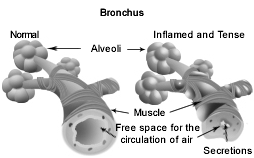Asthma
Asthma is a chronic disease that affects the airways (bronchi). In people with asthma, the airways are swollen and produce more mucus, making it harder to breathe.
Causes and triggers

The exact cause of asthma is unknown. However, it appears that having a family history of asthma and other factors such as allergies or overweight may play a role.
Asthma is a reaction of the airways resulting in swelling. Inflammation increases mucus production, which then builds up. Additionally, the muscles surrounding the airways are more sensitive in people with asthma. When the bronchi become inflamed, they react by constricting even more.
Symptoms
Bronchial inflammation and constriction obstruct airflow, causing the following symptoms:
- Difficulty breathing
- Shortness of breath
- Coughing
- Bronchial secretions
- Wheezing
- Chest tightness
- Rapid breathing in young children
Asthma does not affect everyone with the same intensity and can also vary over time.
Treatment
There are two categories of asthma medications: controllers and relievers.
Controller medications are the cornerstone of asthma management. They are used to reduce inflammation in the airways. They work slowly and should be taken regularly, even when you do not have any symptoms. They help prevent asthma symptoms and reduce exacerbations.
Relievers are also known as "rescue" medications because they are used in emergency situations. Their effects are felt within minutes as they relax the muscles around the airways. They are used as needed to treat asthma attacks and to prevent exercise-induced asthma. Using a reliever twice a week or less is a sign that asthma is well controlled.
Using the proper inhalation technique will ensure better effectiveness. Your pharmacist can teach you how, to maximize the medication's benefits. You may also be advised the use of a spacer to facilitate the optimal administration of medication from a metered-dose inhaler.
Prevention
Damage caused by asthma can become irreversible if left untreated. But with a good personalized action plan for asthma management, it is possible to have a healthy life. Taking the right medication as prescribed by your healthcare professional is essential. Being able to recognize the triggers is also important, in order to prevent attacks:
- Allergens
- Respiratory infections including colds and the flu
- Big changes in air temperature (cold, humidity)
- Air pollution (smoke, strong odours)
- Exercise
- Emotional and stressful situations
- Smoking
- Certain medications
For more information:
© Copyright Vigilance Santé
The patient information leaflets are provided by Vigilance Santé Inc. This content is for information purposes only and does not in any manner whatsoever replace the opinion or advice of your health care professional. Always consult a health care professional before making a decision about your medication or treatment.
